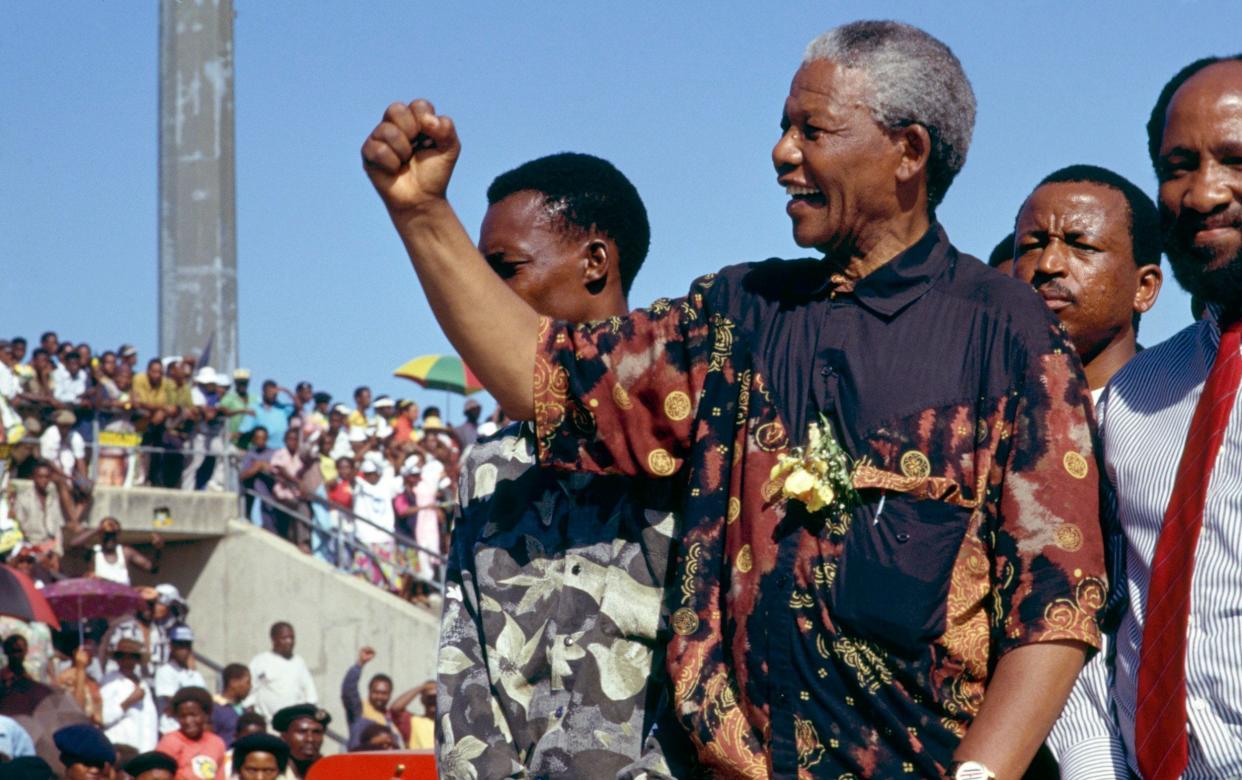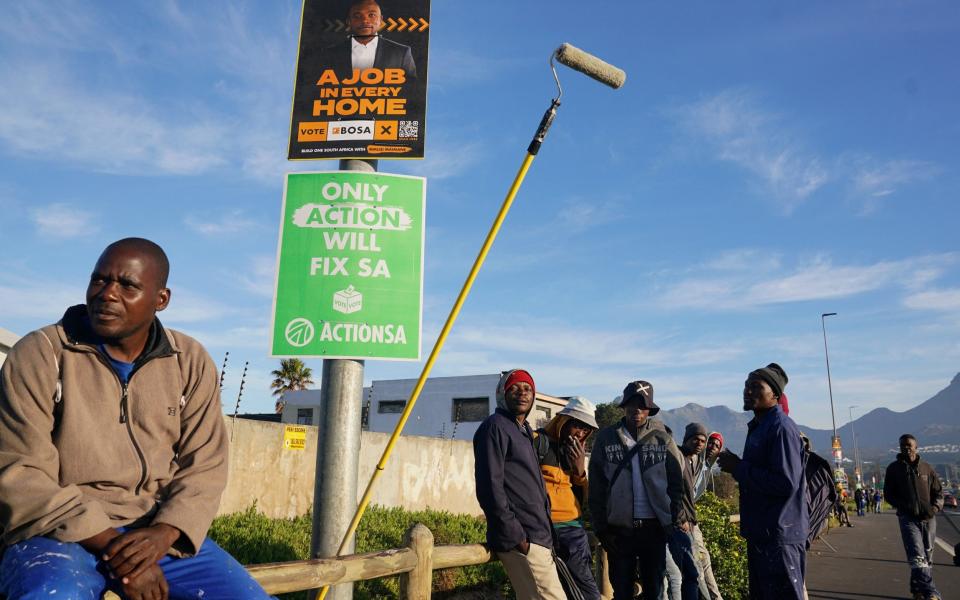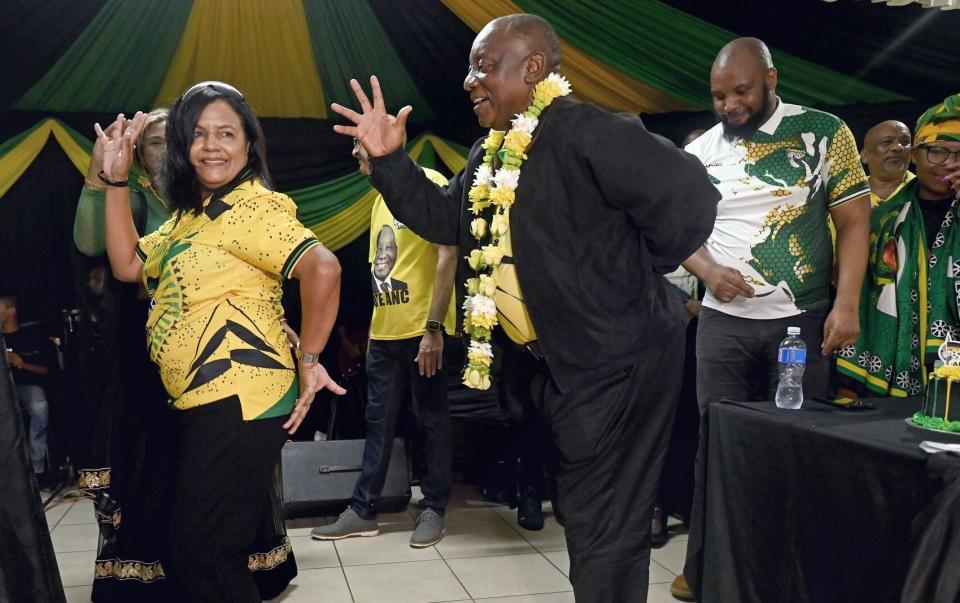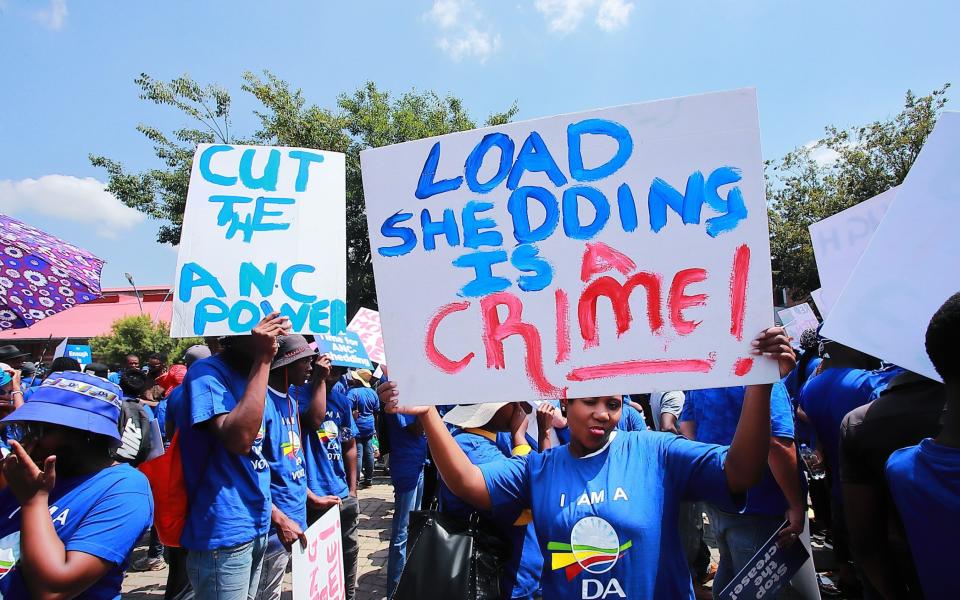How the party of Mandela failed South Africa

- Oops!Something went wrong.Please try again later.
- Oops!Something went wrong.Please try again later.
The presence of Nelson Mandela still hangs powerfully over Soweto, more than 10 years after the death of South Africa’s unifying father figure.
Bus loads of visiting tourists park outside the fenced home he shared with his wife, Winnie, and shop at stalls selling souvenirs and memorabilia.
The sprawling 77-square-mile settlement, an acronym for South-Western Townships, was not only once Mr Mandela’s home, but also a stronghold of the struggle he led against apartheid.
It was here that a 1976 student-led protest called the Soweto Uprising opened the first serious cracks in White rule.
Then, 30 years ago this weekend, as democracy swept away apartheid, people queued for hundreds of yards to vote for Mr Mandela’s African National Congress (ANC) party as it promised a bright new era.
Yet now, as the ANC again faces elections, the disillusionment felt towards the party in Soweto is palpable.
On a visit last week, few of the black residents The Telegraph spoke to would admit intending to put their cross next to Mr Mandela’s former party.
Fed up with unemployment, corruption, entrenched poverty and years of broken promises, they would either vote for the opposition, or had given up on politics completely, they said.
Itumuleng Moloi, a fashionably dressed 43-year-old unemployed woman who previously voted ANC, said this year she would be making a change.
“We have now lost hope so I am going to vote for one of the opposition parties,” she said.
Thabo Mbatha, a 48-year-old tall, lean man, says in this year’s election he will opt for the opposition, the Democratic Alliance, “because they will give us a better life”.
Meanwhile, when asked who he would vote for, Thembikosi Ziqubu, who ekes out a living selling mobile phone accessories, glances up to an election poster for the disgraced former president Jacob Zuma.
Mr Zuma, who led the country with the ANC from 2009 to 2018 and was then ousted as corruption allegations built against him, has quit the party and started his own.
Asked if he was concerned about the allegations against Mr Zuma, Mr Ziqubu shrugged and said: “All [the politicians] did the same.”

On May 29 this year, South Africa will vote in what are widely heralded as the country’s most important elections for 30 years.
The ANC has governed alone since 1994, but is expected to lose its absolute grip on power and be forced into coalition, as its vote share dips below half for the first time.
With roots dating back to 1912, it is Africa’s oldest political movement and has dominated politics in the country for longer than most of its young population can remember.
But patience is increasingly running out in a country battling some of the worst unemployment in the world, rolling power blackouts, collapsing infrastructure, an anaemic economy and endemic crime and corruption.
Pearl Mncube, a political analyst, says this weekend’s celebrations of the anniversary of democracy will not deflect from the government’s current failings.
She said: “We cannot use the past, and any nostalgia attached to it, to avoid accounting for the present.”
“More and more South Africans have grown sceptical of pronouncements from government, due to its history of continuously announcing grand plans without prioritising the swift execution of said plans.”
The ANC enjoyed a lengthy honeymoon after it came to power in 1994. Indeed, its share of the vote increased in its early terms, nudging 70 per cent in 2004.
During its first 15 years in office, the party oversaw the longest period of economic growth on record and increased access to free housing, clean water and electricity.
The tide turned with the election of Mr Zuma in 2008. The global financial crisis slowed growth, while Mr Zuma presided over a systematic looting of the country, which came to be called state capture.
His allies and colleagues took control of ministries and state enterprises so budgets and assets could be plundered with impunity. Some £21bn was pilfered, according to government estimates.
Mr Zuma denied wrongdoing, but the ANC moved to remove him in 2018. He was later jailed for contempt for refusing to testify about the looting.
His successor, the current president Cyril Ramaphosa, has tried to reform and clean house, but has appeared hesitant and ineffectual in the face of the challenge.

The ANC’s vote share fell to 66 per cent in 2009, 62 per cent in 2014 and 58 per cent in 2019.
A lack of impartial opinion polling clouds forecasts of this year’s result, however consensus among analysts is that the ANC will continue its slide to below 50 per cent. Predictions range anywhere from the high forties right down to the high thirties.
Barney Mthombothi, one of the country’s most read political columnists, says: “For many people the ANC became part of their DNA, but the disappointment is severe.
“Our hopes were very high, and for the first years the ANC didn’t do badly. I hope this election will be a turning point because I hope the ANC will get less than 40 per cent, so it will be on notice to behave itself.”
Unemployment is for many at the top of the charge sheet against the ANC, with some 32 per cent of adults out of work.
The figures are badly racially skewed; 36 per cent of the black population are jobless, compared with nine per cent of whites. Youth unemployment is worse, at a staggering three-in-five. The lack of jobs helps make the country the most unequal in the world.
Launching its economic manifesto on Friday, the Democratic Alliance, the biggest opposition party, said the unemployment crisis was the ANC’s “original sin” and “a crime against the people of South Africa”.
The signs are all over Soweto. The streets are clean and tidy, but there are many people hanging around without jobs.
Mr Ziqubu cannot make ends meet selling his phone accessories and relies on loan sharks.
He said: “I had to give up my work some time ago, because I didn’t earn enough to cover the cost of transport. So life is hard.”
Mr Mbatha said: “I will do anything to earn, clean a car, wash shoes, paint a wall, anything. We have friends. We support each other. I am so hungry.”
The economy had been struggling to recover from Covid-19 lockdowns, when two years ago, heavy rolling electricity blackouts landed another blow. A failure to maintain or replace the country’s decrepit coal-fired power stations led to 10 or 12 hours of power rationing each day.
The cuts have eased and then disappeared in recent weeks, but there is widespread suspicion this is an electoral ploy by the ANC, something the government strongly denies.

Meanwhile, crime figures are sky high, with 84 murders per day, while basic state provision of health, water, education and transport is often crumbling.
Despair over the ANC, particularly among those who feel life has not improved post-apartheid and too much money and power still reside in white hands, has driven many poor, young black voters to radical populists.
The Marxist Economic Freedom Fighters (EFF), an ANC splinter group, champions the nationalisation of mines and banks, and the redistribution of wealth. It’s scarlet-beret wearing members sing “Kill the Boer” at rallies. The party denies anti-white rhetoric.
Mr Zuma’s new uMkhonto weSizwe (MK) party, in effect another ANC splinter, is an unknown quantity in elections, but appears to be staking out similar territory.
“Nobody can stop us now,” he told supporters this week. “We are the black children of this nation. We are taking back our country. We will change things.”
The party is seen as likely to take key votes away from the ANC in Mr Zuma’s KwaZulu-Natal heartland.
The ANC meanwhile is trying to remind supporters of the party’s achievements.
At a walkabout in Soweto this week, Thabo Mbeki, who was president for much of the party’s honeymoon period, tried to rally voters. However, as a former critic of the corruption engulfing the ANC, he was also unable to hide his misgivings.
He said: “I have not put aside my concerns. The concerns that are expressed by the people, when the people say, ‘We are unhappy about this, about the other, about the ANC,’ those concerns are genuine.
“We must attend to them. That’s why when I say vote for ANC we are also making a commitment to the people that we will attend to these problems within the ANC itself.”

If the predictions are correct and the ANC takes less than 50 per cent of the vote, it will kick off two weeks of frantic horse-trading to find a coalition.
The shape of that power-sharing will depend on how many votes the ANC gets. If it slips just below the threshold, it will probably be able to make up the difference with electoral minnows.
While the Democratic Alliance is leading a grand coalition of smaller parties that it hopes can oust the ruling party, the ANC may be able to split them off with promises of power-sharing.
The Inkatha Freedom Party (IFP), which has most of its base in KwaZulu-Natal and got 3.5 per cent in 2019, is seen as a likely kingmaker in such a scenario.
If the deficit is larger, the ANC will be forced to make much more difficult decisions about teaming up with bigger parties.
Joining the radical EFF would alarm some of the ANC’s more sober elements and could sow panic among investors and financial markets.
Aligning with Mr Zuma, who feels betrayed by the party that ousted him, could prove to be impossible.
Many in the ANC feel that the Democratic Alliance is too right wing and too white to join forces with.
Whatever the result the ANC seems set to remain by far the largest force in South African politics. But that is unlikely to be enough for party leaders, who will still see the loss of complete power as a failure. In such circumstances, Mr Ramaphosa’s days could be numbered.
“I think you may see a split in the ANC if it doesn’t get more than 50 per cent, over the whole idea of a coalition partner – who to go with,” Mr Mthombothi said.
“Power is the only glue that holds them together, once they are out of power they will splinter.”

